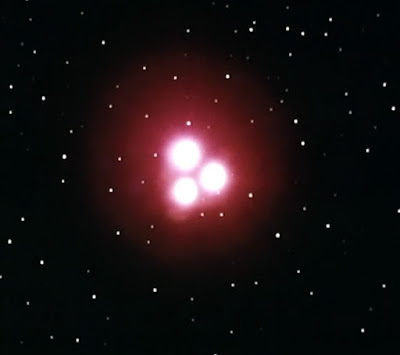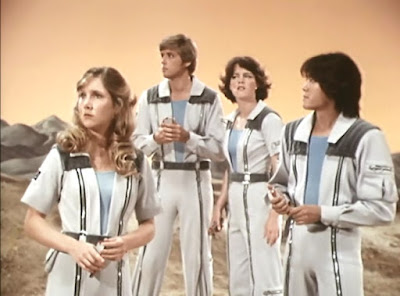In the first episode of Filmation’s Space
Academy
(1977), "The Survivors of Zalon" -- written by Lynn Barker and
directed by Jeffrey Hayden --, a confused Adrian (Maggie Cooper) detects an
unusual "burst of red" on her computer monitor while scanning the
mysterious planet Zalon, which is due to explode in just forty-eight hours.
This unusual pattern means that there could be life on Zalon, even though the
last survey, conducted two years earlier, indicated no life-forms existed there.
Commander Gampu (Jonathan Harris) authorizes a
quick visit to Zalon's surface, and accompanies a team of cadets to the planet's
barren, orange-hued surface; a trip they take via Academy shuttle, the sleek
craft known as a "Seeker."
But a strange scarlet energy field cripples
communications with the Academy, and Gampu drops off the others on the surface
while he returns to orbit to attempt to re-establish contact.
On the planet below, the intrepid cadets
discover a young, flute-playing waif: a curly haired orphan (Eric Greene). He has been tasked with looking after two very valuable orbs.
He possesses no memory of how he arrived on
Zalon, but the energy field from space has provided for his continued existence
in return for his custodianship of those glowing crystals.
It turns out that these two orbs are the energy
field's young. The destruction of the planet Zalon is actually a critical part
of a "great life transformation
process" for them, and the cadets -- by collecting the crystals as samples
-- are interfering.
The crimson energy field in space permits Gampu
to retrieve his cadets on the surface before the destruction of Zalon, provided that he
permits the evolutionary process of their kind continue unimpeded.
Gampu agrees and returns to Zalon's surface.
There, he agrees to adopt the waif, whom he names Loki, after the Norse God of
Mischief.
Very quickly, Loki reveals a
handful of powers, including "special vision" (the ability to see
through walls...) and the power to bilocate.
Early in Space Academy’s first episode “The
Survivors of Zalon,” Commander Gampu makes a declaration about finding life on
the doomed planet Zalon: “We do want to
know. And we do care,” he says.
That statement is practically Star
Trek-worthy in its commitment to space exploration, and respect for all
life.
And it’s a good note to begin the series on too.
Without actually ripping off Star
Trek’s central scenario (a starship visiting other worlds on a
long-term mission…), Space Academy creates a fictional future world here
where promising young cadets are urged to be the best they can be, and to live
up to their greatest potential as citizens of the galaxy.
I suppose that’s one reason why I’ve always
preferred Space Academy to Jason of Star Command. Jason has the action and the villains but Space
Academy has the heart, in some sense, plus a real sense of curiosity
about alien life and the universe.
That curiosity is made apparent in this
story. Here, the cadets encounter orbs
or rocks that they don’t realize are alive.
That mistake is corrected, after some danger, and all is well. But in the meantime, the story involves the fact that life may
take other shapes, or be different from our own, and yet still constitute
life. We may differ in our natures, but
we can still come to an understanding, to a sense of respect with that which is different. That is Gampu’s task here. From
the Seeker, he negotiates his way out of a crisis.
The cadets on the surface -- Tee Gar, Adrian,
Chris and Laura -- do well too. Chris and
Laura use their telepathic abilities to break through a force field, but don’t
follow up that act with violence or force.
Instead, they come to understand the nature of an alien life cycle.
The episode ends with the Space Academy team
welcoming a new member, the mischievous Loki. He is a virtual amnesiac, knowing
nothing of his people or his planet of origin.
But he has found a home, and again tenderness is shown for outsiders. “You will be loved, and you will never again
be alone,” he is told.
So yes, indeed, this is Utopian, Star Trekkian-style space
adventuring, but “Survivors of Zalon” features good production values and good storytelling to boot. In fact, it is
the only live-action series of the 1970s, I would argue, that can compete with Land
of the Lost in terms of story content.
I am also currently watching Lost in Space for its fiftieth anniversary, and so it's a bit strange seeing Jonathan Harris as the honest, sincere Gampu, rather than as the conniving, manipulative Dr. Smith. But he does a good job here of playing an avuncular figure who is driven not by avarice or other bad angels of human nature, but rather by a sense of quasi-parental responsibility. It's also amusing to see that "Survivors of Zalon" immediately establishes a close relationship -- or at least repartee -- between Harris's character and a robot. Only here, it's Peepo, not the Bubble Headed Booby.
Next week: “Castaways in Time and Space”















Filmation's live-action high level trio were ARK II, SPACE ACADEMY and JASON OF STAR COMMAND. As a boy, I loved these series. SPACE ACADEMY was a reboot of both STAR TREK and SPACE:1999. Albeit, the asteroid Space Academy/Star Command with a fleet of Seekers and Starfires makes feel they were more inspired by Moonbase Alpha with a fleet of Eagle Transporters.
ReplyDeleteSGB
Loved this show so much.
ReplyDelete